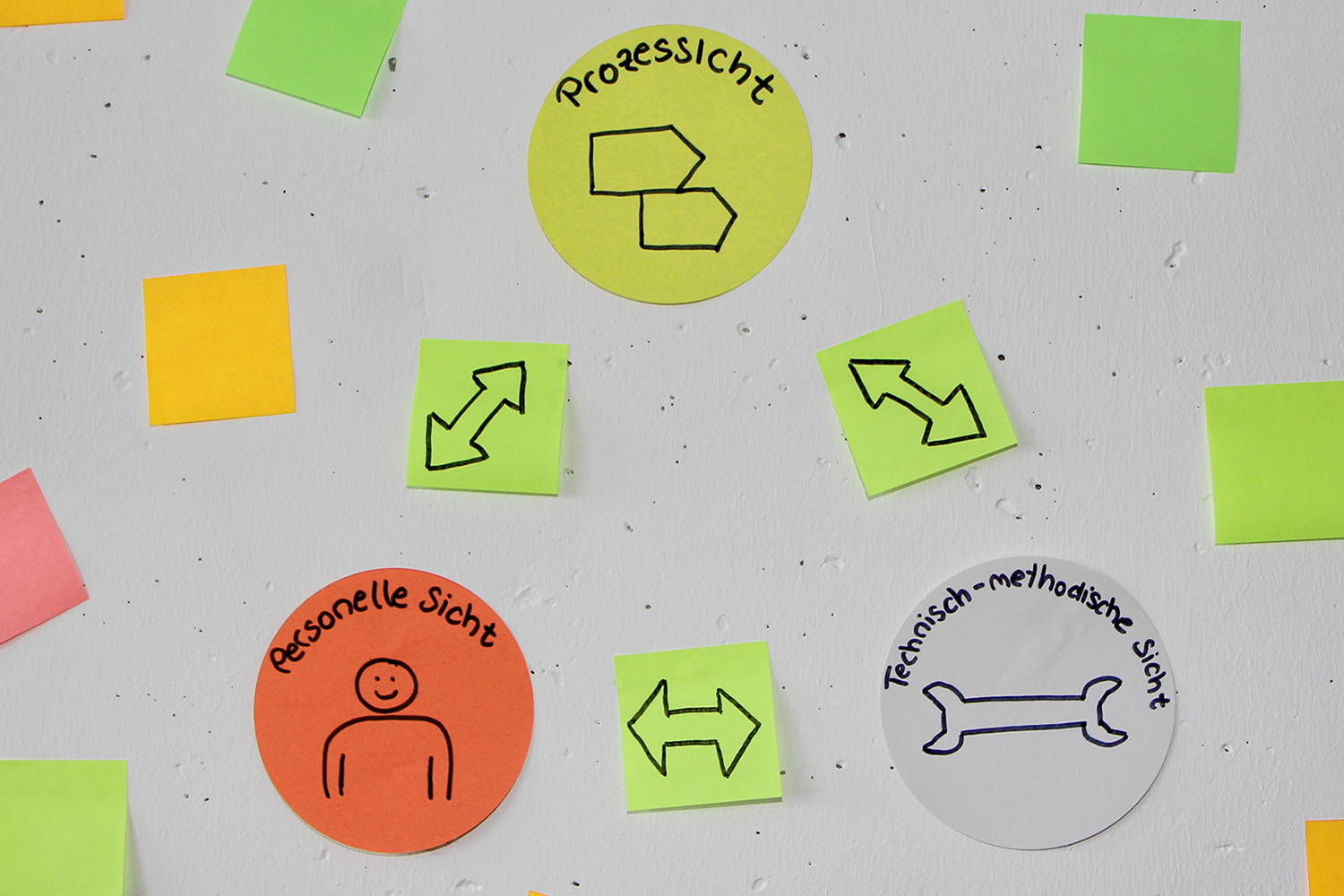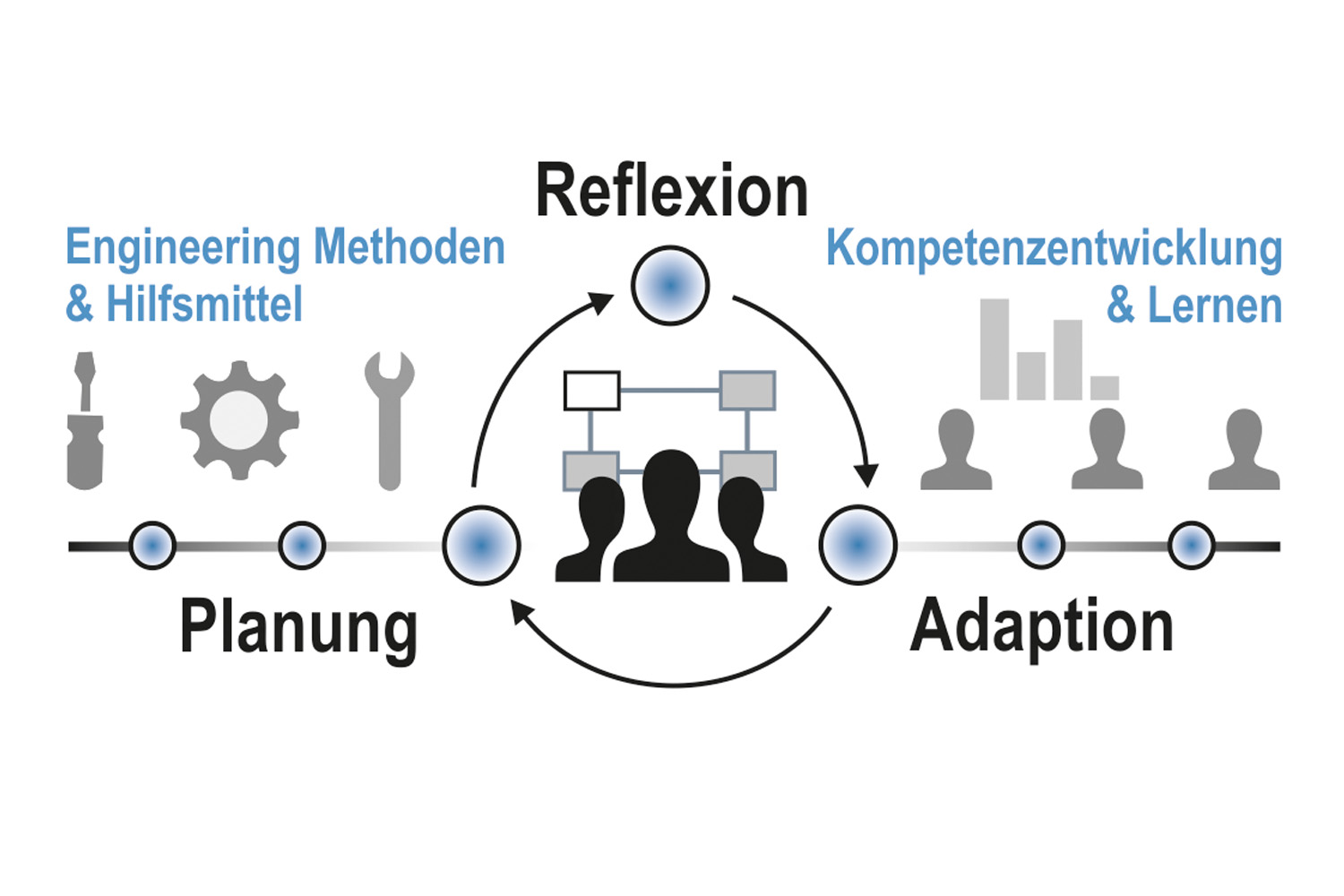Companies as socio-technical systems Optimising skills, processes and products through Advanced Systems Engineering
Products are no longer just products. They are linked to digital services and processes. This requires new skills for employees, constant adaptation of work processes and further development of products, for example through digitalisation, networking and integration of AI functions. This is summarised under the term “Advanced Systems Engineering“. But how can this system be introduced in a company and what does it require? The Institute for Engineering Design (IK) and the Institute of Psychology are working with partners in the RePASE research project to find out. They are looking at companies as socio-technical systems. This holistic approach helps to identify and optimise interactions and dependencies within the company. In this interview, Tobias Huth from the IK and Victoria Zorn from the Institute of Psychology, division of Industrial/Organizational and Social Psychology.

Optimisation by looking at the interaction of technology, processes and employees. Photo credit: IK/TU Braunschweig
A practical example from the automotive industry: Could “Advanced Systems Engineering” (ASE) be used to better manage the transition from internal combustion engines to alternative powertrains and driving concepts?
Tobias Huth: Today’s vehicles can already be described as Advanced Systems. They have (intelligent) assistance systems and are connected to services. In the automotive industry, many efforts are already being made and approaches are being developed to cope with the ever-increasing complexity in vehicles – resulting, for example, from new drive concepts and new driving functions and assistance systems. Changing demands on the skills and competencies of the workforce are also being addressed. Manufacturers have also recognised the need to adapt their development processes. It can therefore be said that the ideas on which ASE is based already exist as “tender seedlings” in the automotive industry.
With the results of the RePASE project, we want to contribute to the development and cross-industry adoption of ASE, which can benefit both SMEs and large companies.
What is the Institute for Engineering Design researching at RePASE?
Tobias Huth: Research at the Institute for Engineering Design focuses on development processes and project management as well as model-based development methods. We describe processes using models that can be interpreted by computers. We describe not only the sequence of activities in the process, but also the information required or generated, the methods used and the software tools. This enables us to describe the socio-technical system of the “development organisation” and to identify or uncover dependencies. Building on this, we want to work out how development processes can be adapted to the current project status during the course of development projects, or how an adaptation can be supported. For example, activities might be skipped or the sequence adjusted. On the other hand, the models also help us to introduce and adapt ASE methods to the existing organisation.
In the area of development methods, we focus on methods that describe the products/systems to be developed using models (i.e. abstracted descriptions of the system elements and their relationships). The current plan is to focus on methods in the area of requirements and variant management.

Reflection through the targeted adaptation of processes, engineering methods and competences in system-oriented development. Photo credit: IK/TU Braunschweig
What are the research focuses of the division of Industrial/Organizational and Social Psychology at RePASE?
Victoria Zorn: In the project we are researching the areas of reflection and learning & competence. In terms of reflection, we are working with our engineering colleagues on how reflection can be used in a structured and systematic way in the product development process. We bring our psychological expertise to the field of reflection. We have long used reflection, often based on feedback tools, with individuals and teams to initiate change and continuous improvement. We are therefore particularly involved in the development of reflection methods that can be used by employees in the product development process.
We also describe the skills that people ideally need to work in Advanced Systems Engineering. We then use these profiles together with the application partners to determine the status quo of relevant competences. Together with our engineering colleagues, we design strategies and formats to enable the (further) development of competences. We work out when which competences are needed in the process and how they can be developed in a work-integrated way, if required.
You describe reflection as a key activity in product development. How can we visualise this?
Victoria Zorn: Reflection in itself is the targeted thinking about one’s own actions, feelings, etc. This already happens implicitly at the level of individual employees when they think about how they can avoid certain mistakes in the future or how they can complete work steps better. It can also be used at a team or organisational level to optimise processes or products in a sustainable way, in order to cope with increasing complexity that cannot be regulated in advance by careful planning. However, reflection needs to be structured and systematised because there is much more to consider than individual reflection. This could be, for example, planning which people (groups) will reflect on what and with what aim at what point in the process. The results of the reflection can help to understand the differences between prescribed and actual processes within the organisation. On this basis, the prescribed processes can in turn be updated. Reflection is therefore not an end in itself, but a tool for continuous improvement and organisational learning.
Employees play a crucial role in Advanced Systems Engineering. What requirements and skills do they need?
Tobias Huth: Answering the question of which qualification profiles employees will need in the future, especially in the context of ASE, is one of the goals that we, i.e. the Institute of Psychology, the Department of AOS and the Institute for Engineering Design, together with colleagues from the Institute of Mechanical Engineering (IMW) at the TU Clausthal, want to research within the framework of the project. Initial studies in this area have already been carried out as part of the accompanying project of the “AdWiSE” funding line. In general, it can already be said that technical and methodological expertise as well as corresponding personal and social skills are equally in demand. In addition, “systems thinking” is necessary in order to recognise the interdependencies within the object under consideration on the one hand and the interdependencies with its environment on the other.[1]
Victoria Zorn: If you look at the work of the AdWiSE accompanying project, you can already find the first competences that companies consider important. In other words, a high level of technical expertise in one’s own discipline and, in addition, a broad base of interdisciplinary skills such as teamwork, communication skills, understanding of complex systems, flexibility, etc. in order to cope well with interdisciplinary cooperation and the overarching requirement of increasing product complexity. We then concretise these very general skills for our application partners and in the project focus more on locating and developing the required skills in the development process.
What should be the result at the end of the research project? What will you do with the new findings?
Tobias Huth: Application partners from various sectors (plant and mechanical engineering as well as rail vehicle technology) are involved in the joint project. This will enable us to identify both industry-specific and general requirements and barriers to the introduction and use of Advanced Systems Engineering. The developed competence models, reflection methods and tools can be used with moderate effort in other companies thanks to the developed adaptation and implementation strategies. Potential users are all companies that develop and produce products with increasingly software-based functions and further develop their products into Advanced Systems. Furthermore, the identified qualification requirements should be integrated into university education or further training concepts.
Victoria Zorn: We will combine the individual findings with the application partners to produce overarching results that can also be used by other companies, especially SMEs. For our field, these are process-related competence descriptions, effective measures to promote reflection and competence development as well as tried and tested recommendations for good work organisation in Systems Engineering.
